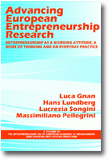
Advancing European Entrepreneurship Research
Entrepreneurship as a Working Attitude, a Mode of Thinking and an Everyday Practice
Edited by:
Luca Gnan, University of Rome Tor Vergata
Hans Lundberg, Linnaeus University
Lucrezia Songini, Eastern Piedmont University
Massimiliano Pellegrini, Princess Sumaya University
A volume in the series: The Entrepreneurship SIG at European Academy of Management: New Horizons with strong Traditions. Editor(s): Massimiliano Pellegrini, University of Rome Tor Vergata. Luca Gnan, University of Rome Tor Vergata. Hans Lundberg, Universidad Iberoamericana. Matthias Raith, Otto-von-Guericke University. Lucrezia Songini, Eastern Piedmont University. Marzena Starnawska, University of Warsaw.
Published 2014
The objective with the Strategic Interest Group in Entrepreneurship (SIG Entrepreneurship) of the European Academy of Management (EURAM) is to be the leading research community for engaged entrepreneurship scholars in Europe. The SIG Entrepreneurship aims at promoting research and networking interests for individuals and research groups focused on entrepreneurship and entrepreneurial styles of management. This is done by providing a wide-ranging, engaged and internationally-focused forum to discuss and develop research and practice in the field. We put a distinct focus on the key European feature – ‘context matter’ – why we try in all activities to promote and stimulate what ‘European’ might mean in any given context. It means different things in different contexts – and that is the whole point – and thereby the key strength of the European takes on the matter as we see it. This is our idea of the European perspective on entrepreneurship.
The tradition of European scholars on entrepreneurship and SMEs system has been consolidated during the last three decades and an increasingly distinct European school of thought has emerged as a consequence. This development provides a solid base for the future development of the field where Europe and its entrepreneurship scholars will play an increasingly prominent role. With this concern, this book has been managed, gathering the best contributions of our annual meeting re-edited and improved. The central theme is presenting entrepreneurship understood as a working attitude, a mode of thinking, a concrete everyday practice and increasingly an identity marker for ways of being and living within liquid modernity. Entrepreneurship is nowadays a broadly endorsed and accepted signifier for forms of organizing that targets human, organizational and economic renewal and growth.
CONTENTS
Introduction: Advancing European Entrepreneurship Research: A Note on the Formation and Growth of the SIG Entrepreneurship of EURAM, Hans Lundberg. PART 1: START- UP AND BUSINESS SUCCESSION. The Impact of Founders’ Proactive Personality on Tie Strength to Acquire Startup Resources, Lien Denoo, Bart Clarysse, and Célina Smith. The Impact of Parents’ Self-Employment on the Offspring’s Succession Intentions: A Survey among Students, Norbert Kailer, Christine Blanka, and Birgit Wimmer-Wurm. Business Transfers and Successions in Finland from the Potential Sellers’ and Predecessors’ Perspective, Elina Varamäki, Juha Tall, and Anmari Viljamaa. PART 2: SOCIAL ISSUES. Analytical Dimensions for Identifying Social Innovations: Evidence from Collective Enterprises in Brazil, Angela Maria Maurer and Tania Nunes da Silva. Ethnic Entrepreneurs: Pushed into Survival Self-Employment or Attracted by Real Entrepreneurial Opportunities? Ethnic Entrepreneurship and Environmental Context in Italy, Sonia C. Giaccone and Massimiliano M. Pellegrini. Self-Representation and Women’s Entrepreneurship: A Relevant Relationship? Typhaine Lebègue. PART 3: MANAGERIAL PRACTICES. The Role of Managerialization and Professionalization in Family Business Succession: Evidences from Italian Enterprises, Lucrezia Songini and Paola Vola. Business Angels’ Practices in the Screening Stage: A Study of Knowledge Transfer to the Entrepreneur, Gilles Certhoux and Alexandre Perrin. PART 4: JUDGMENT AND UNCERTAINTY. Evolution of Entrepreneurial Judgment: Effects of Experience, Uncertainty, and Cognition, Ugur Uygur and Sung Min Kim. Entrepreneurial Strategies in University Spin-offs: Coping with Uncertainties in the Process of Market Creation, Richard Martina, Jonas Gabrielsson, and Daniel Yar Hamidi. Editor Biographies.
-
Paperback9781623967383
Web price: $45.04 (Reg. 52.99)
-
Hardcover9781623967390
Web price: $80.74 (Reg. 94.99)
- eBook9781623967406

- BUS025000 - BUSINESS & ECONOMICS: Entrepreneurship
- BUS035000 - BUSINESS & ECONOMICS: INTERNATIONAL: General
- BUS055000 - BUSINESS & ECONOMICS: Reference
-
 Alternative Methods of Judging Economic Conflicts in the National Positive and Soft Law
Alternative Methods of Judging Economic Conflicts in the National Positive and Soft Law
-
 Asia Pacific Education
Leadership, Governance and Administration
Asia Pacific Education
Leadership, Governance and Administration
-
 Entrepreneurship and Behavioral Strategy
Entrepreneurship and Behavioral Strategy
-
 European Entrepreneurship Research and Practice
A Multifaceted Effort Towards Integration of Different Perspectives
European Entrepreneurship Research and Practice
A Multifaceted Effort Towards Integration of Different Perspectives
-
 Global Issues and Talent Development
Perspectives from Countries Around the World
Global Issues and Talent Development
Perspectives from Countries Around the World
-
 Management Education for Corporate Social Performance
Management Education for Corporate Social Performance
-
 The Entrepreneurship SIG at the European Academy of Management
Setting the Base for Tomorrow's Challenges
The Entrepreneurship SIG at the European Academy of Management
Setting the Base for Tomorrow's Challenges

